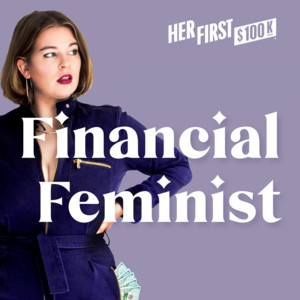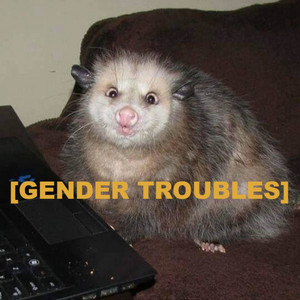Financial Feminist
Financial Feminist is a podcast hosted by financial expert Tori Dunlap, aimed at helping women achieve financial freedom in a world dominated by wealthy white men. With the motto 'fight the patriarchy by getting rich,' the show combines solo episodes with guest interviews to share practical strategies for earning, saving, investing, and building financial confidence. Tori is also the founder of Her First $100K, dedicated to women's financial education and empowerment. The podcast releases full episodes every Monday and mini-episodes every other Thursday, covering entrepreneurship, debt management, retirement planning, financial psychology, and more. Highly rated at 4.7 stars with 6,228 reviews, it's beloved by listeners seeking financial transformation.
🎧 在线收听 Spotify
“Financial Feminist” stands as a revolutionary force in the personal finance podcast landscape, transforming what is traditionally a gender-neutral or male-dominated space into a platform for explicitly feminist economic empowerment. Hosted by Tori Dunlap, founder of Her First $100K, this podcast operates on the powerful premise that achieving financial independence is not just a personal goal but a radical political act that undermines patriarchal power structures.
The Politics of Personal Finance
What distinguishes “Financial Feminist” from conventional financial advice shows is its unflinching analysis of how financial systems are designed to disadvantage women. Dunlap consistently contextualizes personal financial strategies within broader discussions of wage gaps, unpaid domestic labor, career interruptions due to caregiving responsibilities, and systemic barriers to women’s economic advancement. This approach transforms seemingly individual financial challenges into collective political issues requiring both personal action and systemic change.
Fighting the Patriarchy Through Wealth Building
The podcast’s central slogan, “fight the patriarchy by getting rich,” encapsulates its sophisticated understanding of how economic power intersects with gender liberation. Rather than viewing wealth accumulation as inherently oppressive or incompatible with feminist values, Dunlap argues that women’s financial independence is essential for dismantling patriarchal structures. This perspective challenges both conservative assumptions about women’s financial capabilities and progressive critiques of wealth building that may inadvertently discourage women from pursuing economic power.
Practical Feminism in Action
“Financial Feminist” excels in translating feminist analysis into concrete action steps. Episodes provide detailed guidance on salary negotiation strategies that account for gender bias, investment approaches that consider women’s longer lifespans and career interruptions, and business building techniques that address the unique challenges faced by women entrepreneurs. This practical approach demonstrates how feminist principles can guide everyday financial decisions while building toward larger goals of economic justice.
Intersectional Financial Education
While centering women’s experiences, the podcast consistently acknowledges how race, class, sexuality, disability, and other identity factors shape financial realities. Dunlap regularly features guests who represent diverse backgrounds and experiences, ensuring that financial advice accounts for different starting points, family structures, and systemic barriers. This intersectional approach prevents the universalization of middle-class white women’s experiences while maintaining focus on gender-specific financial challenges.
Entrepreneurship and Economic Independence
Through detailed discussions of business building, side hustles, and career advancement, the podcast positions entrepreneurship as a form of feminist resistance to traditional employment structures that may limit women’s advancement. Dunlap’s own journey from marketing professional to successful entrepreneur provides a relatable model while guest interviews showcase diverse paths to financial independence. These conversations reveal both the opportunities and challenges of building businesses as forms of economic empowerment.
Debt, Shame, and Financial Psychology
One of the podcast’s most valuable contributions is its sensitive handling of financial shame and psychological barriers to wealth building. Dunlap consistently addresses how gendered socialization affects women’s relationships with money, from being taught to prioritize others’ financial needs over their own to internalizing messages about being “bad with money.” By normalizing financial struggles and providing compassionate guidance for overcoming psychological barriers, the podcast creates space for honest conversations about money that are often taboo in other contexts.
Investment Strategies and Long-Term Planning
The podcast’s approach to investment advice specifically addresses gender-related factors that traditional financial advice often ignores. Discussions of retirement planning acknowledge women’s longer lifespans and higher healthcare costs, while investment strategies account for potential career interruptions and wage gaps. This gendered approach to financial planning provides more realistic and effective guidance than gender-neutral advice that assumes consistent earning patterns and equal pay.
Workplace Advocacy and Economic Justice
Beyond individual financial strategies, “Financial Feminist” consistently addresses collective action for economic justice. Episodes explore topics like pay transparency, workplace benefits that support working parents, and policy changes needed to create more equitable economic systems. This approach demonstrates how personal financial empowerment connects to broader movements for economic justice.
Critique of Capitalist Structures
While working within capitalist systems to help women build wealth, the podcast maintains a critical perspective on economic structures that create inequality. Dunlap regularly discusses how current financial systems privilege existing wealth, discriminate against marginalized communities, and require systemic change to achieve true economic justice. This nuanced approach allows for practical engagement with existing systems while maintaining vision for transformative change.
Community Building and Support Networks
“Financial Feminist” serves as more than an educational resource—it functions as a community-building platform for women pursuing financial independence. Through social media engagement, live events, and listener interactions, the podcast creates networks of support that extend beyond individual financial planning to collective empowerment and mutual aid.
Educational Accessibility and Resource Development
The podcast’s commitment to accessible financial education includes detailed show notes, resource lists, and tools that make complex financial concepts understandable for beginners while providing valuable insights for more experienced listeners. This educational approach challenges the gatekeeping that often characterizes financial advice, making wealth-building strategies available to broader audiences.
Cultural Impact and Movement Building
“Financial Feminist” has contributed to a broader cultural shift in how women approach money and wealth building. By normalizing conversations about salary, investment, and financial goals, the podcast has helped reduce stigma around women’s financial ambitions while inspiring action. Its success demonstrates the hunger for financial guidance that acknowledges and addresses gender-specific challenges.
Challenging Financial Industry Norms
Through its explicit feminist framework, the podcast challenges the financial industry to better serve women’s needs. Dunlap’s critiques of investment platforms, financial advisors, and banking services that fail to account for women’s experiences have contributed to broader conversations about making financial services more inclusive and responsive to diverse needs.
Future Vision and Systemic Change
While providing immediate practical guidance, “Financial Feminist” consistently maintains vision for longer-term systemic change. Discussions of policy reforms, cultural shifts, and institutional changes needed to create economic justice demonstrate how individual empowerment connects to collective transformation.
Conclusion
“Financial Feminist” represents a paradigm shift in personal finance media, proving that financial education can be both practically useful and politically transformative. Tori Dunlap’s ability to translate feminist analysis into concrete financial strategies has created a resource that empowers individual listeners while contributing to broader movements for economic justice.
The podcast’s lasting impact lies in its demonstration that financial empowerment and feminist politics are not only compatible but mutually reinforcing. By helping women build wealth while maintaining critical analysis of economic systems, “Financial Feminist” has created a model for how personal development content can serve political transformation. For anyone seeking to understand how money functions as both a tool of oppression and liberation, this podcast provides essential insight and practical guidance for navigating and transforming economic systems.
播客信息
Complete transcripts and resources available at herfirst100k.com/financial-feminist-show-notes
相关播客
评论与讨论
与其他听众一起讨论这期播客的内容和观点
加入讨论
与其他听众一起讨论这期播客的内容和观点
加载评论中...

